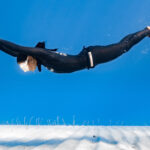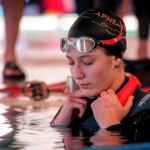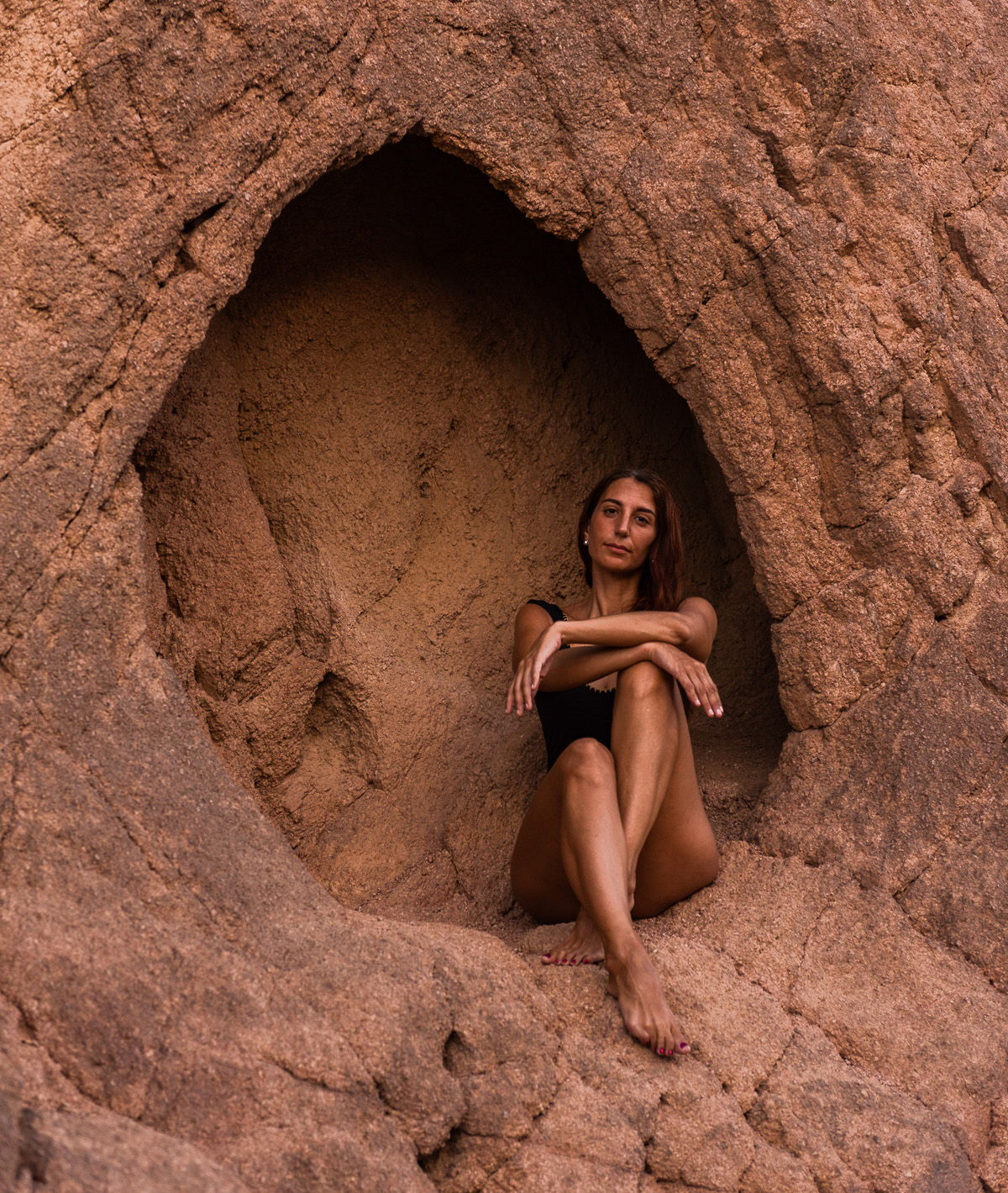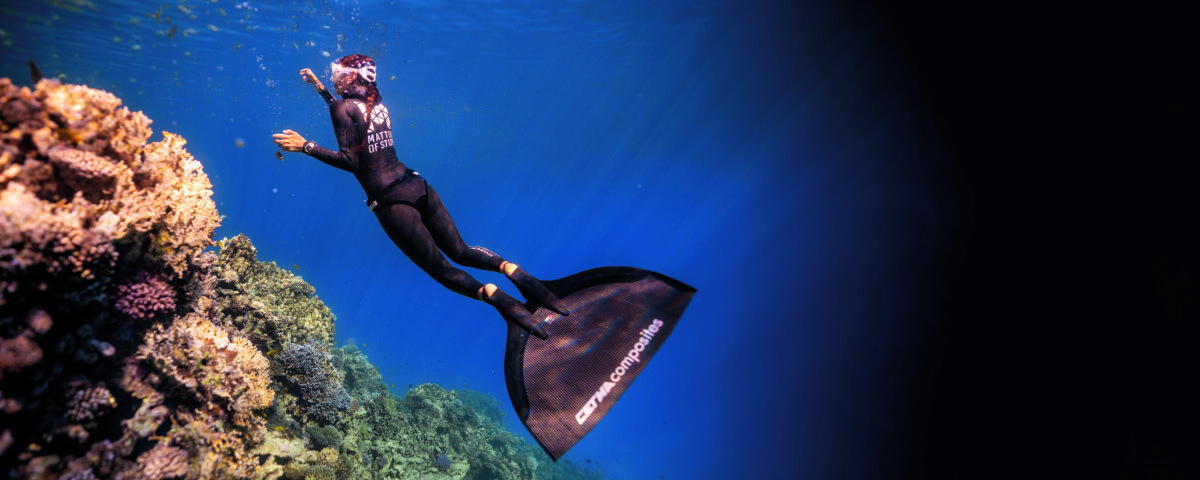My Dahab

My Dahab
24 October 2025
A Chat with Valentina Paglione
27 October 2025Starting this month, our magazine begins a collaboration with Simona, one of the strongest and most eclectic athletes around. A sort of diary in which she will talk about herself, her approach to freediving, her travels, and her projects. The title of the column: Fin & Tonic
Simona Auteri
If ten years ago someone had told me that I would leave London because of a pandemic and move to a dusty, hippie village on the Red Sea—and there begin practicing deep freediving and setting records—I would have burst out laughing. But life is unpredictable and creative. When I stumbled upon freediving by chance in 2018, I somehow knew that the life I’d known until then, made up of rational choices, would change. I felt I had to follow that invisible current pulling me away.
The autumn of 2020 fell heavy over London, the air sharp and the clouds thick as wool. I dreamed only of getting into the water. In November, my friends from my club, Apnea Revolution UK, organized a trip to Dahab—ten days of freediving workshops with Gus Kreivenas, coach, athlete, and founder of the new Touchdown school. Gus’s story was legendary in our club: a Lithuanian welder, used to the dust of London’s construction sites, discovered freediving at our club and decided to leave everything behind to teach in Sharm El-Sheikh, alongside Marco Nones. He began training and competing, reaching 130 meters in VWT. Then he decided to compete at Vertical Blue in the Bahamas—the so-called Wimbledon of freediving—and reached 105 meters in monofin. Upon returning to Dahab, he rebuilt himself as a full-time coach. My friends were obsessed with him—I looked at his photos on social media and skeptically asked, “Are you sure he’s that good?” They were 100% sure.
From the airplane window, the Sinai glowed like an invitation; I had no expectations, but I was ready.
Dahab was wild, golden, and the wind swept away London and the pandemic. The Blue Hole was its sacred ground—it had become the mecca of freediving, a strange, magnetic mix of Bedouins in white galabeyas, European girls in bikinis, guys sculpted in tight black wetsuits, Egyptian voices, and noisy goats. It was chaotic, romantic, and incredibly alive.
Touchdown, Gus’s school, had just been born on the rooftop of a seaside restaurant, between dust and dreams. Gus, full of energy, was friendly with my teammates, but I was new and he watched me from a distance. One morning, during a warm-up dive, he asked me to go down to 30 meters and exhale all the air I could. I did it without knowing why; when I resurfaced, Gus shouted with excitement: I had just demonstrated an exhale dive beyond my residual volume. From that moment on, the energy exploded—I felt strong, connected, and ready. Training took off.
Then an accident changed everything in an instant. Because of the pandemic, we used to disinfect shared equalization tools with spray. Without thinking, I brought it to my nose for exercises before it had dried. Shortly after, I entered the Blue Hole, and after my first dive I surfaced struggling for air: the disinfectant spray had entered my system, my sinuses burned, I couldn’t breathe, I came out of the water coughing and disoriented. The acute discomfort lasted five days—the entire workshop. Gus told me not to worry, that I could come back anytime and finish my course. I returned to London defeated.
At Christmas 2020, another lockdown was announced in Europe. Just before the borders closed, I managed to catch a last-minute flight and headed back to Dahab, planning to stay two weeks. I resumed training with Gus at the Blue Hole: the silence of the deep blue, the roughness of the rope in my hands, the colorful fish of the coral reef, and Gus’s laughter were waiting for me. After just a few days, I reached my first 60 meters. Then January arrived with my return flight—but I let it leave without me.
I trained almost every day and bought an old monofin—its foot pockets stretched, its blade a little cracked—but it still carried so much magic. By the end of February 2021, I reached 73 meters, laughing and wondering how such a worn fin could take me so deep.
Later, a local competition was announced in Dahab for April 2021. Curious, excited, and maybe a bit reckless, I canceled yet another flight and signed up. I dove to 67, 68, and 69 meters in monofin, finishing second, after the French athlete Alice Modolo. It felt surreal—two weeks had turned into four months, and I found myself competing alongside people I had only seen on social media, whose performances had inspired me long before I ever imagined sharing a podium with them.
So I stayed and let life unfold on its own. I found a home and friends; we shared stories and training sessions, nights under the stars in desert oases, sunrises and sunsets over the sea. I fell in love—with the people, the moments, and a rhythm of life that only Dahab seemed to offer. I knew I could leave, that I could go home feeling full and complete. But I wasn’t ready—there were too many sunsets left to greet, new depths to explore, and stories yet to live.



